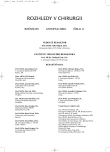-
Medical journals
- Career
Late Hematogenic Infection of Joint Replacements and Its Prevention in Surgery
Authors: D. Jahoda 1; J. Šimša 2; O. Nyč 3; D. Pokorný 1; I. Landor 1; N. Tawa 1; A. Sosna 1
Authors‘ workplace: I. ortopedická klinika l. LF UK a FN Motol, Praha, přednosta: prof. MUDr. A. Sosna, DrSc. 1; I. chirurgická klinika 2. LF UK a FN Motol, Praha, přednosta: prof. MUDr. J. Hoch, CSc. 2; Ústav lékařské mikrobiologie 2. LF UK a FN Motol, Praha, přednosta: MUDr. O. Nyč 3
Published in: Rozhl. Chir., 2006, roč. 85, č. 11, s. 581-585.
Category: Monothematic special - Original
Overview
Introduction:
Late hematogenic infections of joint replacements represent a serious complication. The aim of the study is to assess a patient group with late hematgenic infections of allografts and to propose preventive measures.Methods:
The restrospective study included patients treated for infectious complications of their joint implants in the 1st Orthopaedic Clinic of the 1st LF UK and FN Motol during the 1991–2004 period. The study included 229 patients in total, of which 149 subjects were females and 80 were males. In 123 subjects their hip joint implant infection was managed, in 102 subjects the knee joint endoprosthesis infection and in two subjects the shoulder joint prosthesis infection was managed. The last two subjects sufferred from infections of their elbow joint alloplasty.Results:
Urinary infection or other procedures of urogenital tract were recorded in 37 patients (16.2%). Upper respiratory tract infections preceding deep joint implant infections were reported in 30 subjects (13.1%). Stomatological procedures or oral cavity disorders was diagnosed in 1 subjects (4.8%). Surgical proceudres with suspected bacteriemia was recorded in 6 subjects (2.6%).Conclusion:
Late hematological infections of bone replacements are serious complications with imminent medical and economical consequences. The infection may be caused by a variety of conditions and medical procedures connected to bacteriemia. Provided the risk of the joint implant infection is high (immunocompromised patients, „recent“ endoprosthesis implantation within the last two years), prophylactic antibiotic medication is strongly recommended in all conditions with increased risk of bacteriemia.Key words:
hip joint replacement – knee joint replacement – complications – hematogenic infection – antibiotics – prophylaxis
Labels
Surgery Orthopaedics Trauma surgery
Article was published inPerspectives in Surgery

2006 Issue 11-
All articles in this issue
- Soft Tissue Classification Issues
- Long-Term Results of Microsurgical Varicocelectomy
- Utilization of Continuous Elimination Methods at the Surgical ICU
- Anterior Spondylodesis Using a Corticospongious Allograft in the Combined Management of Th-L Spinal Fractures
- Late Hematogenic Infection of Joint Replacements and Its Prevention in Surgery
- Compound Depressed Fracture of Occipital Bone Causing Laceration of Left Occipital Lobe and Injury of Superior Sagittal Sinus – Case Report
- Venous Injuries During a Ten-Year Follow Up, Including Vascular Injuries Managed in the Bulovka Surgical Department IPVZ
- The Liver Rupture Following Radiofrequency Ablation of Relapsing Hepatocellular Carcinoma
- Preparation of Patients for Operation with Per-Oral Intake on the Day of the Planned Surgery
- Perspectives in Surgery
- Journal archive
- Current issue
- Online only
- About the journal
Most read in this issue- Anterior Spondylodesis Using a Corticospongious Allograft in the Combined Management of Th-L Spinal Fractures
- Late Hematogenic Infection of Joint Replacements and Its Prevention in Surgery
- Compound Depressed Fracture of Occipital Bone Causing Laceration of Left Occipital Lobe and Injury of Superior Sagittal Sinus – Case Report
- Long-Term Results of Microsurgical Varicocelectomy
Login#ADS_BOTTOM_SCRIPTS#Forgotten passwordEnter the email address that you registered with. We will send you instructions on how to set a new password.
- Career

